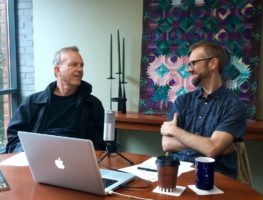In my last article I described how Missional Spirituality is different from what is often thought of as Christian Spirituality.
Missional, as we know is more about identity and formation as opposed to methodology or strategy even though they are important too. Craig Van Gelder and Dwight Zscheile, in their book The Missional Church in Perspective: Mapping Trends and Shaping Conversation agree and they say, that the missional church conversation “was not primarily about the church developing yet another strategic approach for reaching a new generation” and that “‘Doing’ the church’s ministry is absolutely essential to a full view of the church. But such a functional approach to defining the church leaves unaddressed some basic questions about the nature of the church.”
If the missional conversation is more about identity and the nature of the church, then formation is a crucial aspect of this conversation. If the missional is about identity & the nature of the church, then formation is a crucial. Click To Tweet
Disembodying Practices
When we think about usual practices or disciplines that we engage in to shape our spirituality and nurture our relationship with God, mostly we think perhaps of habits such as prayer, Bible reading, church attendance, fasting, all of which are necessary for our spiritual growth. These disciplines as we typically practice them however, can shape us into Christians who live out a disembodied, withdrawing from the world and consumeristic faith. I mentioned these aspects of popular interpretations of Christian spirituality in my last article. What habits would form missional Christians ready to join with God on his mission? Click To Tweet
Keeping in mind the missional characteristics of incarnation, cruciformity, a trinitarian outlook and missional as a way of life, here are some practices that every Christian can engage in regularly in the same way that typical spiritual disciplines are practiced for missional formation.
Four Practices that Shape Us Into “Sent Ones”
Exegeting the neighborhood
Much has been written lately about the importance of place. The authors of The New Parish: How Neighborhood churches are Transforming Mission, Discipleship and Community, emphasize that our neighborhoods are places of God’s activity and that understanding Jesus’ commitment to ministry in a limited geographic space must influence our own view of ministry.
Simon Holt who wrote The God Next Door says,
Associations in your mind between the words mission and neighbourhood might be slim. Perhaps you more easily link the word mission with other more exotic and distant places, or with particular activities of the church. Perhaps mission seems simply too grand and important to tie to the ordinariness of your own street. But again, forging a greater connection between mission and the daily task of loving our neighbors is a task worthy of our time. More than that I think it’s crucial.
In the same way that Jesus connected to his context, we need to do the same. We cannot emulate the incarnation of God but we can embody the gospel in our particular “place.” As we love the neighborhood which we live in, we embody the gospel for a watching community.
One discipline which we can regularly practice to get to know our community is the act of “Exegeting the neighborhood.” It is simply the act of regularly and faithfully walking through our neighborhood and becoming aware of what God is doing. As we love our neighborhood, we embody the gospel for a watching community. Click To Tweet
We can ask questions such as, “Where do I see signs of hope?” “Where are there signs of destruction and lifelessness?” “Where can I discern God’s activity?” “Where is there a sense of loneliness, sickness, marginalization?” “Where are people gathering to celebrate?” We do this knowing that God is already at work in our community and wants to open our eyes to show us what he is doing. So as we engage in this missional habit, we must be open to the Spirit’s leadings and promptings.
Practicing radical acts of hospitality
Letty Russell says “Hospitality is the practice of God’s welcome by reaching across difference to participate in God’s actions bringing justice and healing to our world in crisis.” I believe that this posture of welcoming, for Christians, is modeled on the interior life of the Trinity. Although we are on sacred ground when discussing the inner dynamics of God, we see from scripture that there is a mutuality, unity and love within the Trinity which ultimately extends itself outwards towards the world.
This is no small or insignificant thing. As Christine Pohl in her book Making Room: Recovering Hospitality as a Christian Tradition says, “Although we often think of hospitality as a tame and pleasant practice, Christian hospitality has always had a subversive countercultural dimension. ‘Hospitality is resistance’. Especially when the larger society disregards or dishonours certain persons, small acts of respect and welcome are potent far beyond themselves. They point to a different system of values and an alternate model of relationships”
We can point to the alternate values of the kingdom of God by practicing radical acts of hospitality regularly. This is hospitality as a spiritual discipline which goes beyond the thought of simply entertaining guests. Disciplining ourselves to smile at a marginalized person or buying them a cup of coffee, practicing inviting the foreigner over for a meal, taking time to get to know someone who is “the other” are all signs of the breaking through of the reign of God in our world. This is what it means to practice cruciformity in a culture which is dedicated to doing things for others only if we gain advantage from the act. Practice cruciformity in a culture that only serves others only if it gives us an advantage. Click To Tweet
Praying with eyes open
Normally when we pray we close our eyes, shut off from the world and focus on what we are saying to God. Praying with eyes open is a missional practice because as we see what is going on around us, the Spirit will prompt us to pray for things that we would probably never have prayed for. Reggie McNeal in Missional Renaissance writes about engaging his church in this practice. He asked people to go to a public place such as a park, cafe or shopping center and ask God to help them see what God sees. As God prompted them, they were to pray about what they saw. He writes
This simple outing radically changed their outlook as they realized that what was in the heart of God was much bigger than typical church concerns, They began to see broken families, homeless people, at-risk children, stressed teenagers- all people they were not engaging with their church ministry. Gripped by the heart of God, they gained and urgency to address what they saw.
As we pray when we drive to work, shop for groceries, walk the dog, God will connect us with the heartbeat of our neighborhood and reveal to us his work that we might join with him.
Reading Scripture in Public Places
Instead of reading the Bible devotionally in the quietness of a room which can sometimes make the reader focus on ‘my’ needs and ‘my’ growth, this reading is done in public in order to apply the word to what the reader sees before his or her eyes. This practice is called Lectio Missio and the point is to apply the text to the life of the neighborhood as seen perhaps in a busy cafe or park for example. In this context we would ask “God what is your word telling me about my neighborhood and the needs here?” Again, this habit is practiced in order to connect with the place in which God has put us for the extension of his kingdom.
Each of these missional habits can be practiced regularly in the same way as typical spiritual disciplines. I believe that as we practices these disciplines, the Spirit works through them to change us that we might become missional. This is an “everyday spirituality” which rather than retreating from the world, engages with the world. As we do this our relationship with God is not compartmentalized but is integrated into the daily stuff of life. Missional habits can be practiced regularly in the same way as typical spiritual disciplines. Click To Tweet
Dorothy Bass and Craig Dykstra in Practicing Our Faith: A Way of Life for a Searching People say,
When we see some of our ordinary activities as Christian practices, we come to perceive how our daily lives are all tangled up with the things God is doing in the world. Now we want to figure out how to pattern our practices after God’s, and it becomes our deepest hope to become partners in God’s reconciling love for the world.
Why not try asking your small groups to engage with these or other missional practices for several months to see if any real missional transformation occurs in your congregation?











Missio Alliance Comment Policy
The Missio Alliance Writing Collectives exist as a ministry of writing to resource theological practitioners for mission. From our Leading Voices to our regular Writing Team and those invited to publish with us as Community Voices, we are creating a space for thoughtful engagement of critical issues and questions facing the North American Church in God’s mission. This sort of thoughtful engagement is something that we seek to engender not only in our publishing, but in conversations that unfold as a result in the comment section of our articles.
Unfortunately, because of the relational distance introduced by online communication, “thoughtful engagement” and “comment sections” seldom go hand in hand. At the same time, censorship of comments by those who disagree with points made by authors, whose anger or limited perspective taints their words, or who simply feel the need to express their own opinion on a topic without any meaningful engagement with the article or comment in question can mask an important window into the true state of Christian discourse. As such, Missio Alliance sets forth the following suggestions for those who wish to engage in conversation around our writing:
1. Seek to understand the author’s intent.
If you disagree with something the an author said, consider framing your response as, “I hear you as saying _________. Am I understanding you correctly? If so, here’s why I disagree. _____________.
2. Seek to make your own voice heard.
We deeply desire and value the voice and perspective of our readers. However you may react to an article we publish or a fellow commenter, we encourage you to set forth that reaction is the most constructive way possible. Use your voice and perspective to move conversation forward rather than shut it down.
3. Share your story.
One of our favorite tenants is that “an enemy is someone whose story we haven’t heard.” Very often disagreements and rants are the result of people talking past rather than to one another. Everyone’s perspective is intimately bound up with their own stories – their contexts and experiences. We encourage you to couch your comments in whatever aspect of your own story might help others understand where you are coming from.
In view of those suggestions for shaping conversation on our site and in an effort to curate a hospitable space of open conversation, Missio Alliance may delete comments and/or ban users who show no regard for constructive engagement, especially those whose comments are easily construed as trolling, threatening, or abusive.